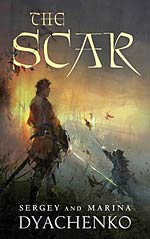
![]() Stella Atrium
Stella Atrium
3/23/2013
![]()
The Scar by Sergey and Marina Dyachenko, the Ukrainian award-winning husband-and-wife team, was originally published in 1997 in Russian. A series of four books are available in English from Tor.
**spoiler alert** Set in a burgher city (not a castle) in the time of the Black Plague, our hero Egert Soll is an officer of the regiment, an egotistical philanderer, who kills the student fiancé of a girl he fancies named Toria. Egret is cursed by the Wanderer so that his courage is replaced by shrinking cowardice.
Leaving regiment and family behind to seek relief from the curse, Egert travels to a distant city where Toria lives with her father, a mage and the Dean of the University there. The magic is kept in the background, and the scheming mage of a competing guild is wholly evil with no nuance.
Some reviewers compare The Scar to Fyodor Dostoevsky who wrote Crime and Punishment, but I don't see the similarity except in broad categories like "dark" "Russian" "novel". Dostoevsky's work was always about moral challenges and how betrayal or lack of nurturing has consequences – and therefore about choice. Dyachenko's story offers many situations where Egert is humiliated and heaps shame on him with relish. But Egert Soll was driven by the curse and had no choices except one time he uttered "no" instead of "yes". This is not a moral dilemma where his free will decides his fate.
The plot seems prosaic, presenting few named characters but with an internal twist where Egert replaces the earnest student who he killed. In a decade when fantasy writers kill off the supposed hero(es) so that secondary characters carry the weight of the plot (Martin), or present a hero who doesn't succeed in his task (Abercrombie), the story in The Scar seems more a fairy tale set in the horrific days of the Black Plague.
Toria's father vanquishes the sickness with one self-sacrificing act. The hero overcomes his cowardice and is instantly transformed into a fighter who can win with swords against a bevy of guards, even though he had no training or exercise for a year. The girl seems steady in her course (two-dimensional again) and loves Egert before and after his curse is relieved. All other characters are dead, and some justly so. A simple melody and not a fugue.
http://stellaatrium.com/dyachenko